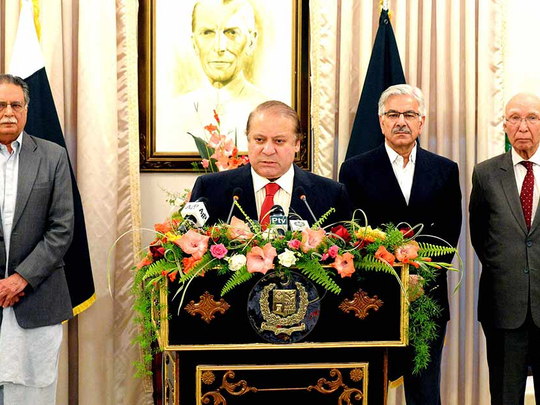
Islamabad: Pakistani Prime Minister Nawaz Sharif on Monday endorsed the parliament’s decision to “stay neutral” in the Yemen conflict but stressed Islamabad’s “solidarity” with Saudi Arabia and GCC countries.
Reading a ‘policy statement” on state television, Sharif tried to explain his country’s position, which disappointed Pakistan’s Gulf allies, saying Pakistan was bound by its “long term commitment” to Saudi Arabia’s sovereignty, territorial integrity and stability “is the main pillar of our foreign policy”.
Earlier the prime minister held a high-level consultative meeting that was also attended by Army Chief General Raheel Sharif.
“Pakistan does not abandon friends and strategic partners especially at a time when their security is under threat,” the prime minister said.
Saudi Arabia is one of the most important strategic allies of Pakistan, which attaches great importance to sanctity of the two holy mosques and full support to their custodian, he said.
Sharif said Pakistan has conveyed its firm assurance to Saudi brothers that “we shall stand shoulder to shoulder with them.”
On Saturday, the parliament unanimously passed a resolution affirming its “neutrality” in the Yemeni conflict.
UAE Minister of State for Foreign Affairs Dr Anwar Mohammad Gargash commented on Twitter that the Pakistani parliament’s rejection of intervention in Yemen is “unexpected from Islamabad”.
The decision that stipulates “neutrality in the Yemeni conflict” and expresses “its genuine support for Saudi Arabia” is “contradictory and unexpected from Islamabad”, he added.
“The Arabian Gulf is in a dangerous and fateful confrontation and its strategic security is at stake. Moments like these distinguish real allies from those of media statements.”
Diplomatic focus
Sharif yesterday said Pakistan strongly condemned actions of the Al Houthi militia and other non-state actors to overthrow the legitimate government of Yemen and expressed serious concern at the rapidly deteriorating humanitarian situation there.
“There is urgency of finding a peaceful solution to the crisis through dialogue among warring factions,” he stressed.
The prime minister said that Pakistan would intensify its diplomatic efforts in coming days in consultation with the leadership of Saudi Arabia to resolve the Yemeni crisis. He said the resolution passed by the Parliament on April 10 endorses these principles and strengthens the hands of the government for playing a positive and constructive role.
The resolution, he said, affirmed in clear and categorical terms that any violation of the Saudi territorial sovereignty or threat to the two holy mosques would evoke a strong response from Pakistan.
Massive commitments
Sharif said these assurances have been given despite “massive commitments of our armed forces” in the ongoing operation Zarb-e-Azb operation in the country against terrorists.
He said Pakistan has already intensified contacts with Saudi Arabia to monitor the ground situation and possible threats to the security and territorial integrity of the kingdom.
Sharif said he had conveyed to the Iranian foreign minister during his recent visit to Pakistan that violent overthrow of legitimate Government of Yemen had “set a dangerous precedent that was fraught with serious risks for the entire region.”
He added: “There should not be any doubt about our policy of solidarity with GCC states.”












